New Oil Boiler Cost
Last updated 21st August, 2024
Do you need to know more about oil boiler replacement costs?
This guide covers all you need to know about having a new oil boiler fitted. We look into oil boiler prices, the average oil boiler installation cost and types of oil boilers available. On average you can expect to pay in the region of £1,800-£6,500 to have a replacement boiler installed.
Continue reading for an in-depth guide!
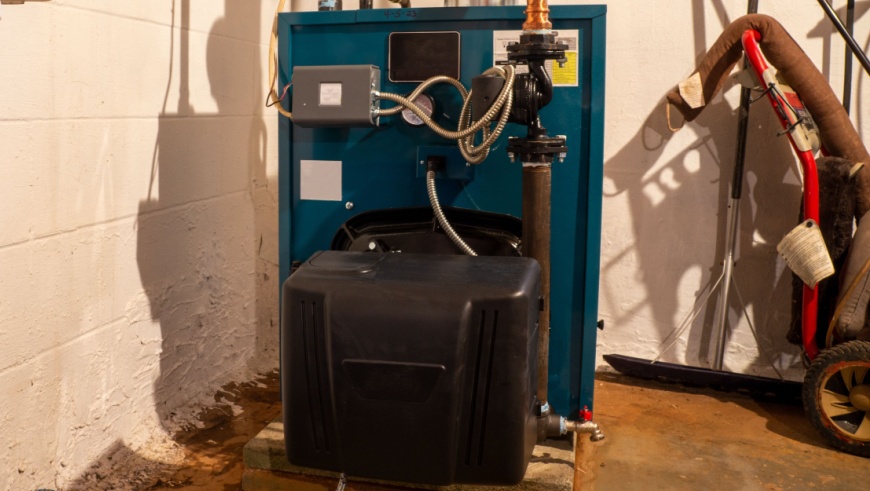
How Much Does It Cost to Install an Oil Boiler?
For those who either choose to have an oil boiler or who are not on the main gas system, the price of installing an oil boiler will be a significant deciding factor.
Although they are not as common as gas boilers, there are still a wide range of types, styles, and models available. Depending on the type you choose and the output you need, the oil boiler installation cost will vary.
One of the first decisions will be whether to have a combination, system, or conventional boiler. This may depend on the existing heating system and whether you wish to change it.
Combination boilers are the most popular, providing heating and hot water on demand and without the need for water storage tanks as they are fed directly by the cold water mains supply.
The average cost to install an oil combination boiler is between £1,800-£6,500, depending on manufacturer, output, and location.
So, how much is a new oil boiler?
System boilers also take water straight from the mains and heat it, the hot water is then stored in a cylinder ready for use. These boilers are better for larger households where the demand for hot water is greater. The average cost to install an oil system boiler will be around £1,500-£5,200 depending on the size of output, location within the UK and make of the boiler.
A regular or conventional oil boiler will take cold water from a tank in the loft and store the heated water in a cylinder. They are the oldest type of boiler and not often seen other than in traditional properties. The cost to install a regular oil boiler will be similar to that of a system boiler. In the region of £1,500-£5,250 depending on the manufacturer, size, and location within the UK.
However, if your regular boiler breaks down and cannot be fixed and a new boiler is needed, you will likely need to replace it with a condensing boiler. This is due to Building Regulations passed in 2005, although in some cases it may be possible to fit a regular boiler as an exception.
Combination and system boilers can both be condensing as it just means that the heat that would normally be lost via the flue is recovered and used.
The size of your new oil boiler will be dictated by the size of your property and the number of radiators in the house.
For example, a small to medium-sized house will have between 10-15 radiators, while a large house may have 15-20 radiators.
Of course, the more radiators that need to be heated, the greater the boiler's output will need to be therefore, the kilowatt power will be very important.
A one-bedroom flat will not require the same size oil boiler as a five-bedroom detached house, and therefore, there will be significant price differences.
Finally, the location of your home will affect the price that you pay for an oil boiler installation. Prices in the southeast of the country will be higher than in other areas due to the higher cost of living.
However, demand in London, where prices for heating engineers are among the highest in the country, will not be particularly significant as most homes in London are on mains gas.
Places such as the Highlands or very rural areas of the country are more likely to need the services of an oil fired boiler. Although these places are remote and typically attract higher prices to attend for any kind of installation, these are exactly the kind of places where an oil boiler will most likely be needed.
Oil Boiler Prices
Below is a table of the installation costs of different types of oil-fired boilers. Prices will vary according to make, kilowatt output and location in the UK.
| TYPE OF OIL BOILER | AVERAGE COST | PRICE RANGE |
|---|---|---|
| Combination | £3,600 | £1,800-£6,500 |
| System | £3,150 | £1,500-£5,200 |
| Conventional | £3,150 | £1,500-£5,250 |
Table of Contents
- How much does it cost to install an oil boiler?
- Labour costs and timeframes
- Cost affecting factors of installing an oil boiler
- What does installing an oil boiler entail?
- DIY oil boiler installation
- Types of oil boiler
- Oil tank installation costs
- Oil boiler running costs
- Benefits of an oil fired boiler
- Building regulations for an oil boiler installation
- Planning permission for an oil boiler installation
- Removing an oil boiler
- FAQs
- How to find & hire an oil boiler installer
- Sources
Supply Costs
Below are the supply only oil boiler costs. The cost of installation and labour is not included.
| TYPE OF OIL BOILER | AVERAGE COST | PRICE RANGE |
|---|---|---|
| Combination | £2,350 | £1,300-£4,600 |
| System | £1,900 | £1,000-£3,200 |
| Conventional | £1,900 | £1,000-£3,250 |
Additional Costs
With the installation of a new oil fired boiler, there may be other work that you want to do at the same time.
You may want to replace your radiators with newer models or upgrade to designer radiators for a more contemporary look. The cost to replace a radiator will depend on the size and type you are installing, but the average cost for a like for like replacement will be around £150-£250.
Perhaps you decide to have no radiators but want to install underfloor heating instead. Electric underfloor heating will cost between £60-£75 per square metre to install, while wet underfloor heating will cost between £100-£120 per square metre.
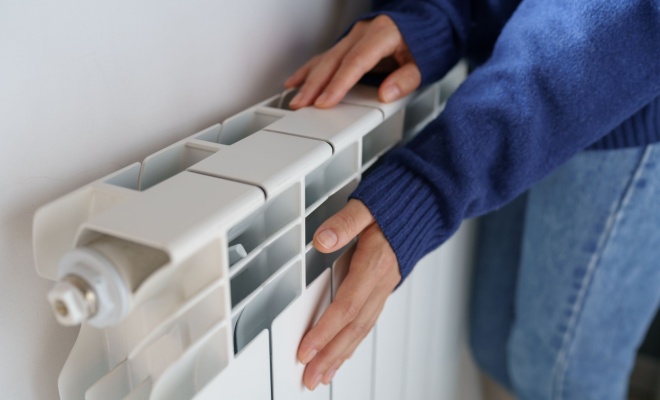
Before you replace your current boiler with a new oil fired boiler, you may want to power flush the central heating system to get rid of any build-up of sludge and debris in the radiators.
The cost to power flush your system will be approximately £300-£500, but this will depend on where in the country you live and the number of radiators in the system.
Cost Breakdown Calculator
Individual costs for hiring a heating engineer to install a combination oil fired boiler. Total cost: £3,600.
Materials
£2160
Labour
£1440
Waste removal
£0
Labour Costs and Timeframes
Labour costs for installing an oil boiler should include the fitting of the boiler and all necessary pipework.
Still, you should consider the fitting of the oil storage tank, which should be included in the overall cost, before agreeing a price. It is advisable to obtain at least three quotations before hiring a company or heating engineer to fit your new oil fired boiler.
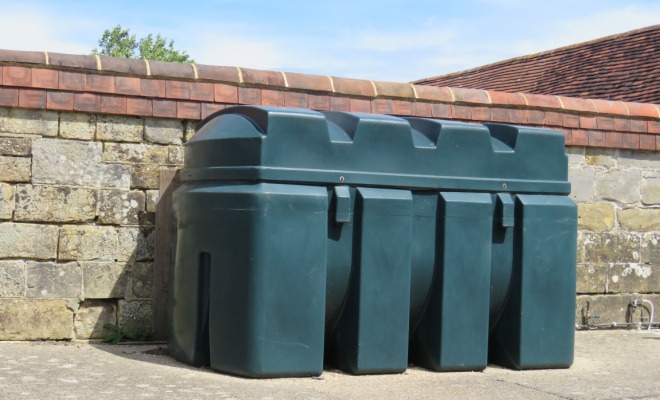
A plumber will cost around £30-£75 per hour in most parts of the UK while in London this will be higher at about £100-£130 per hour. However, few people in London will be having an oil boiler fitted due to the widespread availability of mains gas which is cheaper.
The cost of a heating engineer will be approximately £40-£80 per hour in most places, but in London, this could be as much as £110-£160 per hour in London and surrounding areas.
Timeframes
A straightforward installation of an oil boiler should take no more than one to one and a half days. If an old boiler is being removed or the boiler is being relocated, the process may take up to three days.
If the work is not an oil boiler replacement but a new installation, then you will need to have a storage tank fitted at the same time. This will increase the timeframe slightly.
If you are replacing an existing oil-fired boiler with a newer model, installing a new storage tank may be necessary as the existing storage may not comply with newer regulations.
Tanks do degrade over time, and it may be worth the investment to protect your new oil boiler.
Cost Affecting Factors of Installing an Oil Boiler
Several factors will influence the cost of installing an oil-fired boiler in your property.
Property Type
Another influencing factor on the cost of installing an oil boiler will be the type of property that it's being installed in.
If you have a one-bedroom flat or two-bedroom terraced home, there will be fewer rooms to heat and fewer occupants to place demand on the hot water supply. This means that the boiler will not need to be very large, saving on outlay and installation.
Size of Property
Similarly, the property's size will determine the oil boiler's required output, which will have cost implications.
A large house will require a powerful and robust oil boiler, which will be reflected in the overall cost.
A large house with several bathrooms will likely need a boiler with a sizable output to supply enough heating and hot water for the property.
Size
The size of the oil boiler doesn't refer to the physical size or dimensions but the output in kilowatts. The power output of the boiler should match the size of your property.
If the kilowatt power output is too low, then your system will struggle to produce enough heating and hot water.
On the other hand, if the system is too large for the property, you will waste fuel and money.
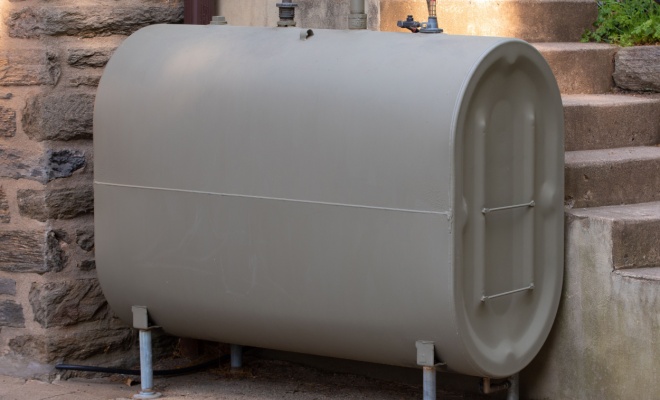
This is why it is important to have a qualified heating engineer recommend a boiler for your home based on calculations of the size and the demand for heating and hot water.
Type of Boiler
Oil boiler prices will be affected by the type of boiler that you fit in your home. Combination oil boilers are more expensive as they tend to be more efficient and compact than system or conventional oil boilers.
However, combination oil boilers will only serve small to medium-sized households and will struggle to provide enough hot water for larger properties or those with multiple bathrooms.
Number of Radiators
A boiler needs to match the number of radiators in the property. Therefore, this too will influence the size and cost of the oil boiler to be installed.
A property with numerous radiators will require a large boiler, while a home with fewer radiators will need a less powerful model.
The below table gives an indication of the size of the oil boiler needed according to the number of radiators in the property.
| Number of Radiators | Combi Boiler | System Boiler | Regular Boiler |
|---|---|---|---|
| Up to 10 | 24-27 kW | 9-18 kW | 9-18 kW |
| 10 to 15 | 28-34 kW | 18-26 kW | 18-26 kW |
| 15 to 20 | 35-42 kW | 27-40 kW | 27-40 kW |
Location
The cost of heating engineers varies across the country, with London and the southeast the most expensive areas while the north of England, Wales and parts of Scotland are cheaper in comparison.
However, the need for oil-fired boilers is greater in these areas due to their more remote locations and distance from the mains gas supply.
Ease of Access
The process of fitting an oil boiler means that good access will be required to the boiler's proposed site.
If there is difficulty accessing the location, there may be cost implications in manpower and time.
The oil storage tank in particular needs to be carefully sited for delivery of fuel and allowing the required distance from the property or other boundaries for safety reasons.
What Does Installing an Oil Boiler Entail?
One of the first things to do when considering a new oil boiler is to have the optimum size calculated by a heating engineer.
This will ensure that the boiler's power output will be adequate and appropriate for the size of the property.
Calculations will be based on the property's size, the number of radiators in the house, and the type of oil fired boiler that you choose to fit.
Location
Deciding on a location is also important unless it is an oil fired boiler replacement and going into the same space.
Location is important in terms of the placement of the oil storage tank and the flue from the boiler.
For condensing oil boilers, there will need to be an outlet for the condensate pipe to discharge the slightly acidic water vapour. This condensate needs to flow into a drain or a soakaway.
Oil fired boiler flues must not terminate underneath windows or where the height of the building would interfere with the draw of the flue.
The flue should be at least one metre horizontally distance from any windows, doors or ventilated soffits and eaves.
An oil tank will be fitted in the garden or other outside space and will need to sit on a concrete base, the dimensions of which will be recommended by the manufacturer.
The oil line from the storage tank to the house may be buried underground to protect it from damage and frost or may run along an external wall.
The oil storage tank also needs to be accessible for the refuelling truck, which needs to be considered when sitting the storage tank.
If it is not possible to site it close to an access road, additional pipework will be needed to allow refilling.
If the storage tank is located close to the property, a concrete 'fire' wall should be constructed as a safety measure.
Oil boilers are unique in that it is possible to have some models fitted externally. They can also be fitted in utility rooms, garages, or sheds.
This is because they can be quite large and bulky and may take up valuable space in the home. External oil boilers are carefully insulated and protected from the weather.
Once the oil boiler and storage tank's location has been decided, the physical work of installing the oil boiler can begin.
Installation
If replacing an existing boiler, the central heating system will need to be drained down before the new boiler can be put in place. The new oil boiler will then be fixed in its allocated space.
The oil line from the storage tank to the boiler will be installed, and this pipework will be fitted with an isolation valve, a filter, and a mandatory fire valve. The fire valve is designed to activate at a pre-set temperature in the event of a fire in the boiler and prevent the spread of the fire to the storage tank.
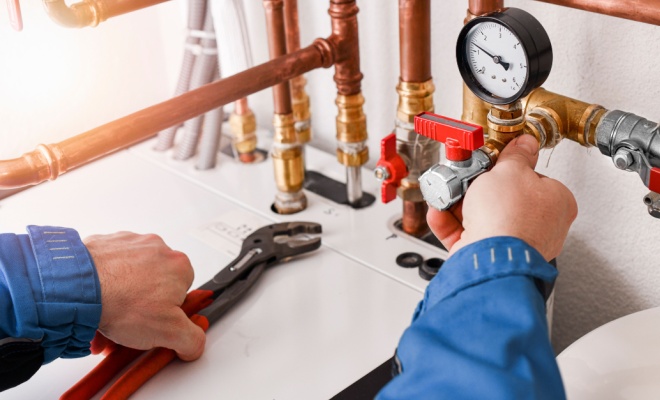
A reducer is fitted to the outlet of the oil storage tank, and the open/close valve with a lever is installed.
A power flush of the system should be done once the system is operational, with steps taken to ensure that any dislodged debris is not taken into the new boiler.
The new oil fired boiler should be commissioned to ensure that it functions as it should, and there are no issues.
Different Method
Some oil-fired boilers are designed to be fitted outside and have robust casings and added insulation to protect against the weather.
These boilers are normally fitted close to the house's external walls with a protective sleeve covering the pipework to prevent freezing in very cold weather.
If you are replacing an oil boiler and the existing pipework is not up to standard, it may be necessary to replace it with new pipes.
Similarly, if the oil boiler being installed is a different type from the existing one, then additional works will be needed.
For example, the existing boiler may be a regular or conventional type with a header tank and hot water cylinder, and you may want to install a combination boiler.
DIY Oil Boiler Installation
Installing a boiler of any type is a job for an experienced and qualified professional and is not the kind of job that should be tackled as a DIY project. An oil boiler replacement or new installation is no different, and it is recommended that you only allow an OFTEC or similarly qualified heating engineer to carry out this work.
Dangers of DIY
There are serious dangers associated with a badly or incorrectly fitted boiler regardless of what fuel type it runs on.
However, those boilers which run on fossil fuels such as gas or oil emit toxic carbon monoxide as a by-product of combustion.
This gas is invisible, odourless and extremely dangerous to occupants of the property. Exposure can cause serious health problems or death if it goes undetected.
There is also the danger of badly fitted boilers causing other problems such as electrical fires or fuel leaks. For these reasons, it is recommended that only a registered OFTEC or similarly qualified heating engineer install an oil fired boiler.
DIY Savings
If you want to reduce the oil boiler cost, then you could build the concrete base for the oil storage tank as a DIY job.
You will need to know the dimensions required by the oil storage tank manufacturer but doing this yourself may save you some money and time.
The amount you save will depend on the quote you were given that includes this part of the installation, but it may be around £100-£200.
The concrete base will typically need 300mm clearance around the storage tank once it is in place but check the manufacturer's recommendations before finalising the base's size.
The tank should also have sufficient distance from any boundaries, but you need to check the individual criteria of the tank you are fitting.
You will need to clear and level the site of the oil storage tank, construct a frame for the concrete, mix the concrete and pour it into the prepared frame. For this, you will need:
- Spade/shovel
- Spirit level
- Timber for the frame
- Sand & cement
- Cement mixer
The safety equipment you will need is:
- Safety boots
- Gloves
- Safety goggles
- Dust mask
Building Regulations
Installing an oil fired boiler does come under Building Regulations due to the safety issues and the need for energy efficiency. Installers must follow the guidelines in Approved Document J when fitting an oil boiler. There are regulations for putting in a new oil storage tank, too, which includes the positioning of the storage tank.
Sign Off
If the installer is registered with OFTEC or another competent person scheme, they can self-certify that their work is compliant with Building Regulations. However, if the oil boiler fitter is not registered with such a scheme, you will need to notify your local authority of the work in advance and pay a notification fee. This will add to the oil boiler installation cost.
Once complete, the local authority will send someone to check the oil boiler installation, and if it is compliant, will issue a completion certificate.
Types of Oil Boiler
There are three main types of oil boiler: combination, system and conventional. They are quite different in how they are set up and how they function, so choosing the right one is important.
Combination Oil Boiler Cost
These boilers provide hot water and heating on demand as they take cold water directly from the mains and heat it. There is no need for hot water cylinders or header tanks in the loft.
The average combination oil boiler cost is around £2,350.
Pros
- ✔ It gives instant hot water and heating
- ✔ Compact and uncomplicated system
- ✔ Efficiency of over 90%
Cons
- ✖ Will not provide enough hot water for larger households
- ✖ Highest of oil boiler prices
- ✖ Installation may depend on your incoming water pressure
System Oil Boiler Cost
A system oil boiler also gets the cold water supply directly from the mains, but once the boiler has heated the water, it is stored in a hot water cylinder.
The average cost of an oil system boiler is approximately £1,900.
Pros
- ✔ Good for larger households as the heated water is stored in a cylinder
- ✔ Relatively cheaper than an oil combination boiler
- ✔ Does not need a header tank in the loft
Cons
- ✖ It relies on good mains water pressure
- ✖ You will need to find space for the hot water storage cylinder
- ✖ Hot water is not available on demand
Conventional Oil Boiler Cost
The oil boiler cost to replace a conventional boiler may be higher as these boilers have largely been replaced with more modern and efficient combination and system boilers.
The average cost of a conventional oil boiler is £1,900.
Pros
- ✔ Relatively inexpensive compared to a combination boiler
- ✔ Good for a like for like oil boiler replacement
- ✔ Suitable for larger properties
Cons
- ✖ Not as efficient as combination or system boilers
- ✖ You need space for a cold water header tank in the loft
- ✖ Space needed for a hot water cylinder
Oil Tank Installation Costs
Regardless of the type of oil boiler, you have fitted in your home, you will need an oil storage tank. This tank feeds oil to the boiler and will be filled on a regular basis by a tanker lorry.
Types of Oil Storage Tanks
Oil storage tanks are available in plastic and metal and come in various sizes from 900 litres up to 3500 litres for domestic use.
Plastic Oil Storage Tanks
Plastic oil storage tanks that hold more than 2500 litres of oil have to be 'bunded', which means that they are essentially double skinned.
Tanks that hold less than this may be required to be bunded depending on the assessed pollution risk.
The double skin provides additional security as in the event of a rupture in the tank, the oil would be contained by the second skin of the tank.
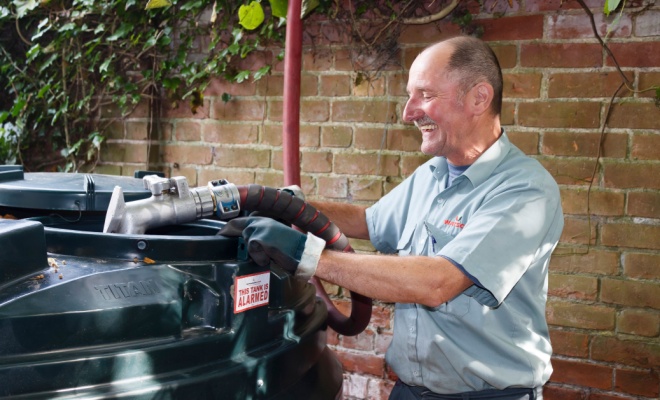
Plastic tanks need to be sited on a solid concrete base to ensure stability, and this should be at least 1.8 metres from the property.
A single skin plastic oil storage tank may cost around £600-£800, although the cost will depend on the tank's capacity.
A double skinned or 'bunded' oil storage tank can cost between £1,100-£1,400, but again, this will depend on the size.
Metal Oil Storage Tanks
Metal oil storage tanks are typically made from steel and do not need to be installed on a concrete base due to their rigid structure but should be raised off the ground on concrete piers.
They offer better security against theft or vandalism and can be made to bespoke sizes, although they require more maintenance.
Metal oil storage tanks can also be single skin or double skin to protect against spillage. A single skin metal tank can cost around £500-£700 depending on size and supplier, while a double skin or bunded tank may cost approximately £1,000-£3,500.
Plastic and metal oil storage tanks can be fitted with a Watchman device that monitors the amount of oil in the tank and sends an alert when it reaches a certain level.
The cost of installing an oil storage tank will be in the range of £800-£1,200, and this will largely depend on the size and type of the tank and your location in the UK. Installation should be carried out by a registered OFTEC heating engineer or other qualified professional.
Oil Boiler Running Costs
Although the vast majority of households have gas boilers, for the four million people in the UK who are not connected to the gas grid, there is usually only the option to have an oil-fired or electric boiler.
Most people know that electricity is the most expensive way to heat your home and avoid using this source where possible.
So, if the option to have an oil boiler is available, most people choose this due to the lower oil boiler running costs.
While the oil boiler cost may be relatively expensive, the running costs compared to electric heating are much less.
An oil-fired boiler will cost around 4.81 pence per kilowatt hour, while an electric boiler will cost 16.36 pence per kilowatt hour, making it almost three and half times more expensive than oil. Gas is the cheapest fuel to run a boiler on at 4.17 pence per kilowatt hour, although not cheaper than oil.
Benefits of an Oil Fired Boiler
There are many benefits of using an oil-fired boiler, particularly for those whose homes are not connected to the gas grid.
There are two million households in the UK that use electricity for their heating needs as they are not on a mains gas supply. However, this is a very expensive option, so most people in that position choose an oil boiler.
At just under 5 pence per kilowatt hour, an oil boiler's cost is an attractive option if mains gas is not available, particularly compared to electricity.
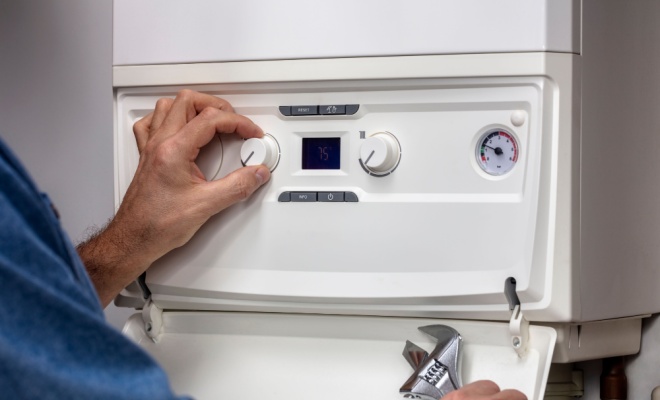
Most oil-fired boilers these days operate at above 90% efficiency, which reduces costs as the fuel is burned without much waste.
As the oil for the boiler is stored in a tank on your property, you can be certain that there will be no interruption to your heating service as long as you keep your tank topped up.
The oil can be delivered practically anywhere in the UK, so there should be no issue about obtaining your supply as and when you need it.
The price you pay for your oil will be linked to the price of crude oil, which can fluctuate over time. However, you can take advantage of those times when the price is low to stock up.
Building Regulations for an Oil Boiler Installation
The installation of a new oil boiler will be subject to Building Regulations due to the need for compliance with safety and energy efficiency guidelines.
For this reason, an oil fired boiler should only be installed by an OFTEC technician or someone registered with a similar competent person scheme.
The Building Regulations apply to the oil boiler itself, which should have an efficiency of above 85%.
As long as the installer is registered with one of the recognised competent person schemes, they will be able to self-certify that the oil boiler installation is compliant.
Suppose you hire someone who is not registered with a recognised competent person scheme. In that case, you will need to notify the local authority before the works proceed and pay a notification fee.
The cost of this fee will vary across different councils. The local authority will then send someone to check the installation when it is complete, and if compliant, they will issue a commissioning certificate. The building control department of your council will then send you a completion certificate.
Information about the Building Regulations that apply to installing an oil boiler can be found in Approved Document J on the Planning Portal.
You can contact your local authority to inquire what you need to do before installing an oil boiler.
Planning Permission for an Oil Boiler Installation
There are no specific planning permission requirements if you want to install an oil boiler. However, the installation of an oil storage tank may be subject to planning permission in certain situations. For example:
- It is within the boundary of a listed building.
- The oil storage tank is bigger than 3,500 litres.
- SThe siting of the tank is proposed forward of the principal elevation of the house.
- The maximum overall height is more than 3 metres or 2.5 metres if within 2 metres of a boundary.
- It takes up more than half the size of the garden around the original house. This means the house as it was first built or as it stood on 1st July 1948.
- Siting is proposed at the side of a property on 'designated land'. Designated land includes national parks and the Broads, Areas of Outstanding Natural Beauty, conservation areas and World Heritage Sites.
- On designated land, if the maximum area to be covered by the storage tank more than 20 metres from the house is more than 10 square metres.
If any of the above applies to installing an oil storage tank on your property, you will need to apply for planning permission. If none apply, then you can install the storage tank under permitted development.
For full information on fitting an oil storage tank on your property, you can check the Approved Document J or contact your local authority's planning department.
Removing an Oil Boiler
If you wish to remove an oil fired boiler, it will need to be disconnected from the oil supply coming from the storage tank as well as from the electricity supply.
For safety reasons, it is advisable to hire an OFTEC heating engineer or similarly qualified person to remove the oil boiler rather than attempting it yourself.
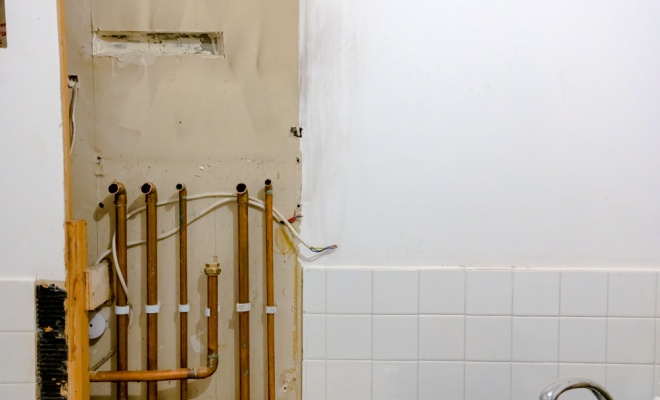
If the oil storage tank is not being replaced and has oil still in it, this will need to be drained and disposed of separately. Specialist companies have equipment that will siphon the oil out into another tank to either remove it or replace your storage tank with a new one, they can transfer the fuel from one to the other.
Once removed, you will need to find a way to dispose of the oil boiler and the storage tank. It is unlikely that you will be able to take them to your local recycling centre as they will probably be considered commercial waste.
You may be able to find a local company that will dispose of it for you for a fee, or the heating engineer who is installing your new boiler may be willing to take it away for you.The cost of any of these options will be dependant on the arrangement that you make.
FAQs
How to Find & Hire an Oil Boiler Installer
If you wish to install an oil boiler, then you should hire a qualified and experienced oil boiler installer to carry out the work. It is not advisable to install one yourself due to the safety issues and the need to conform to strict Building Regulations.
The cost to hire a heating engineer to supply and install a combination oil boiler will be around £3,600 on average.
What to Look For
The first thing to look for in an oil boiler installer is the qualification that they are competent to do such work. Not all heating engineers will be proficient in oil boiler installation as the vast majority of boilers in the UK are fuelled by gas, so it is important to check this before hiring someone.
Getting recommendations from family, friends, neighbours, or work colleagues who have had an oil boiler fitted is a good way to find a reliable and reputable installer. It is advisable to check how long they have been in business, whether they have premises or operate purely from a mobile number or website, before proceeding.
Qualifications
The qualifications needed to fit an oil fired boiler can be obtained from training bodies such as OFTEC or specific training companies.
To train for these qualifications, it would be necessary for someone to have experience as a plumber or heating engineer.
Experience
Before hiring an installer, you should ensure that they have relevant experience in oil-fired boilers and, if needed, in fitting an oil storage tank as well. You can ask for references from previous clients or ask to see completed installations.
Accreditation
A qualified oil boiler installer will have accreditation from the training body they studied with, and this could be OFTEC, APHC (Association of Plumbing & Heating Contractors) or similar. Most heating engineers and technicians will have ID to prove their credentials and should be able to produce them.
Insurance
All tradespeople working in your home should have insurance to cover them in the event of accident, injury, or damage.
Most will have public liability insurance which protects members of the public or third parties from injury or damage to property as a result of the work.
Training
All oil boiler installers should receive training from a certified training company or association such as OFTEC, APHC or similar. This training is additional to the basic plumbing or heat engineering qualifications that a boiler installer should have.
How to Check Qualifications & Certifications
You can ask your oil boiler installer to prove his qualifications with certification, or you can go to the relevant website and look them up.
Most professional tradespeople actively provide this information as standard, but if the information is not readily available, you can ask to see proof of qualifications and accreditations.
Be wary of any contractor who claims to be qualified or accredited but cannot produce documentation as proof.
Sources
https://www.boilerguide.co.uk/articles/new-oil-boiler-replacement-installation-costs#oil-combi-boiler-prices
https://www.theheatinghub.co.uk/guide-fitted-oil-boiler-prices
https://www.viessmann.co.uk/heating-advice/what-size-of-boiler-do-i-need
https://carnegiefuels.co.uk/cost-to-replace-domestic-oil-tank/
https://www.cpsfuels.co.uk/news/cps-fuels-guide-to-domestic-heating-oil-tanks-heating-oil-tank-faqs
https://www.tanksforeverything.co.uk/oil-tank-manufacturers/atlantis-storage-tanks-easytank-portafuel-storafuel-puratank/atlantis-easytank-plastic-and-steel-oil-tanks-for-heating-oil/atlantis-easytank-single-skin-steel-oil-tank
https://www.ovoenergy.com/guides/energy-guides/heating-costs-gas-vs-oil-vs-electric-storage-heaters.html









